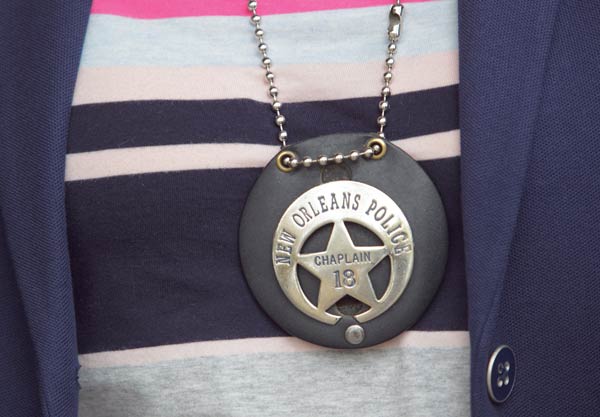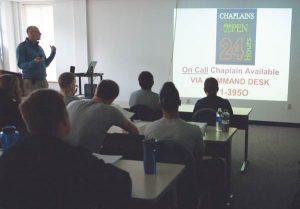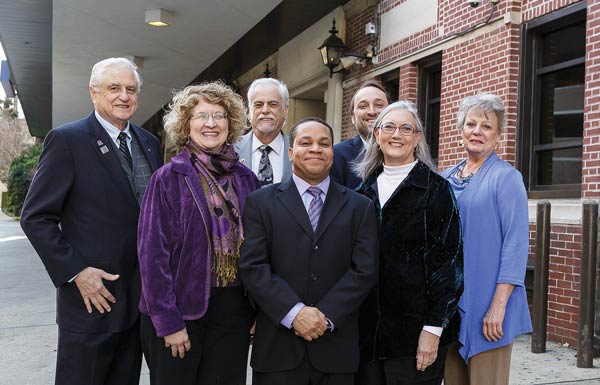Keep the Faith
BCM chaplains minister to the men and women behind the badge and offer spiritual support to hospitals and nursing homes
From Crime Scenes To Hospital Beds Chaplains Offer Comfort
The dedicated team of 12 highly trained board certified chaplains made almost 82,000 contacts in 2014 through their work in hospitals, nursing homes, and with the New Orleans Police Department.
 A squad of four serves as spiritual helpers to all eight districts and headquarters. The chaplains work in their assigned districts, attend roll calls, ride-alongs with officers, and are ready for duty 24/7 for spiritual support on crime scenes. They’ve stood over bodies, ministered in the streets, and performed funerals and weddings for officers and their family members and baptized their children.
A squad of four serves as spiritual helpers to all eight districts and headquarters. The chaplains work in their assigned districts, attend roll calls, ride-alongs with officers, and are ready for duty 24/7 for spiritual support on crime scenes. They’ve stood over bodies, ministered in the streets, and performed funerals and weddings for officers and their family members and baptized their children.
“Our ministry is different,” says Faith Berthey, “we have to earn trust in a close knit society.” Two of the police chaplains are former first responders themselves, Joe Cull, a veteran firefighter, and June Wilder, a law enforcement officer for two decades. All the chaplains say officers let them know their presence at crime scenes is invaluable.
“We listen to their needs and process through emotions,” says Brian Cleveland. “We are a spiritual presence there,” says Wilder. “We don’t judge them.” Berthey adds, “The police can be human beings with the ministers.”
At a session at the New Orleans Police Academy, the chaplains welcomed new recruits to let the future officers know who the chaplains are and what they do. Cull projected onto a classroom screen a presentation titled “New Orleans Police Confidential” (set to the Pink Panther theme song).
“It is my hope that the presentation helps convey that not only are we professionally trained but we are also personable, approachable and available to the recruits and officers,” Cull explains.
One slide showed a sample of the help chaplains offer: relationship issues, job stress, on-scene support, prayer upon request, spiritual support. “We don’t work for NOPD,” Berthey assured the class, “What you tell us stays with us.”

Chaplain Joe Cull kicks off a presentation at the NOPD Academy.
A team of eight chaplains ministers to patients and their loved ones, and staff at hospitals and nursing homes. The chaplains serve at West Jefferson Medical Center, Children’s Hospital, Touro Infirmary, Tulane Medical Center, Interim LSU Hospital, Covenant Nursing Home and Uptown Health Care Center.
Debra Guidroz, assigned to region’s only Level 1 trauma center at ILH, calls the chaplains’ work a “ministry of presence.” For Guidroz, her most important role is caring for families of the wounded. “Our job is to love strangers,” she says.
A chaplain’s job also involves support for the medical team. “They use me as a sounding board to talk about struggles and grief,” says Allen Mitchell, chaplain for Children’s Hospital. “Doctors are usually glad chaplains are with them,” Mitchell says. He recalls the time a surgeon stopped in the middle of an operation to make sure the nurses assisting him could receive communion.
Sometimes a hospital chaplain is a patient’s only non-medical contact. James Hightower, The McFarland Institute Vice President, Chaplaincy Services, recalls watching Mitchell playing with a sick child of incarcerated parents for 15 minutes. “Play is their work,” says Mitchell. “It’s how they get a concept of God.” Hightower adds “Allen demonstrates the love of God with the kids, and tries to make that connection with them.”
Rene Dorsey, chaplain at Covenant Nursing Home and Uptown Health Care Center, is sometimes the only person without a stethoscope or tray of pills to visit his patients.
“The ministry is easy because I don’t poke, prod, coerce, so they love me,” he says of the senior citizens he serves. “I pray with residents, talk about the weather; I have no agenda; it’s their space and I respect it.” His patients also understand part of his role is helping them prepare for their passing, something he describes as like losing a friend.
But not everyone recognizes what healthcare chaplains do. Barbara Duke, oncology chaplain at West Jefferson Medical Center, recalls visiting a 12-year old patient who didn’t get it. Duke explained the job as “faith therapist.” Duke adds, “Everybody has some type of spirituality.”

Healthcare chaplains (front left to right) Jane Mauldin, Allen Mitchell, Barbara Duke (back left to right) Royce Ballard, Rene Dorsey, Zac Ritchie, Debra Guidroz (Not pictured: Jennie Thomas)